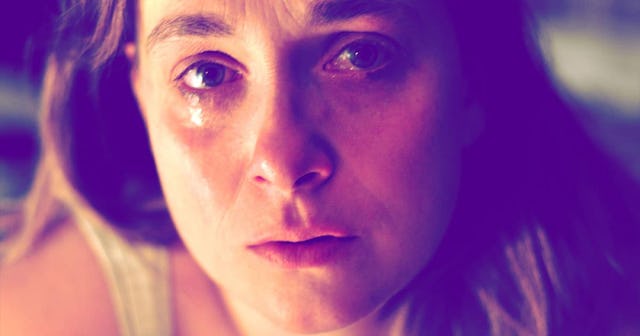I'm Grateful My Mom Isn't Alive This Mother's Day

“Hey Courtney,” my sister said too softly when she called me too early on that Monday morning last August, “What are you doing right now?” I knew what she was going to say before she finished the sentence. “Go ahead and tell me,” I said, closing the bedroom door so the kids wouldn’t see me cry. Mom was gone.
It wasn’t as if I was expecting the call that day—or even that year. Parkinson’s and arthritis had started to get the best of Mom’s 83-year-old body, but she was still plugging away, albeit more slowly and more painfully. It was clear she didn’t have years left, but her death hadn’t seemed imminent—until it was.
Courtesy of Courtney Reynolds
I collapsed on the hotel bed and plotted how to hold it together for the next few hours. My husband and I, along with our two young daughters, were on a house hunting trip in Colorado. I had accepted a job outside of Denver, and we had made the trek from Milwaukee to quickly find a home so the girls would have a school when we relocated.
We had spent the last few days racing from town to town and house to house, trying to figure out where we wanted to live, all with a five- and eight-year-old in tow for every minute of the grind. We didn’t get our first choice, but we got our second. And, now we were supposed to walk through it with our realtor in 90 minutes.
That was the first challenge. Then came telling the girls, writing Mom’s obituary, and flying back to Milwaukee, only to repack and leave a day later for her funeral in my home state of Virginia. I was fortunate my brother and sister lived nearby and could handle the many details that needed attention. But juggling a career transition and impending move—plus juggling the emotions of my immediate family—was almost more than I could handle.
Telling the girls that we were moving, that they would start a new school two weeks late, and that Grandma had died didn’t make me the most popular person in our household. They were angry, and I was the villain who needed to be punished. I had to be strong for them, and I had to resist the urge to forcibly shake the mean girl out of them.
Justin Case/Getty
I was hurting, but there was too much to do for me to crumble. I had my moments for sure—especially when telling my high school friends who knew the wonderful woman Mom was—but there wasn’t time to grieve. Then COVID-19 entered the picture.
I’ve learned that grief may let you ignore it for a time, but you can’t escape it. It doesn’t care if you’re a control freak or a generally stable person who sees the glass as half full. It will find you, often when you least expect it. And it did.
It started small—missing my daily conversations with Mom, wanting to tell her about the mundane moments our family was spending together as we hunkered down. Who else would appreciate the 8,000 puzzles we’d put together or the family walks we’d started?
Then I began crying during random movies, and one night I was in tears as my husband and I watched Sully. When he asked what was wrong, I told him it hit too close too home because that was the period when we were flying US Airways weekly in and out of LaGuardia, and I felt a kinship with those passengers. He wasn’t buying it, and neither was I.
Courtesy of Courtney Reynolds
It was pretty simple when you think about it. Society was shuttered, and I had nowhere to run. The frantic pace and frivolous details that had clouded my mind and prevented me from truly realizing my loss had dissipated. There was silence and stillness which allowed the real pains of life to unmask themselves and reveal the dark faces beneath them.
Thankfully for me, light followed the darkness. When I stopped focusing on my loss and emotions and started thinking outside of myself, I realized Mom was where she wanted to be. As wonderful as her senior community was, she wouldn’t have been able to have visitors, and she would have scoffed at the confinement. She most likely would have described herself as “nervous as a cat”—one of her classic phrases—because she would have felt like a caged animal. Her few remaining pleasures would have been removed, one by one.
My sister, who so capably attended to my Mom in her final months, would have been crushed she couldn’t help her—and likely would have been scolded if she didn’t deliver the right brand of toilet paper. And, none of us would have wanted to tell Mom that the annual family beach trip she treasured may not happen this year.
Courtesy of Courtney Reynolds
Most telling was that during her last few months, Mom had started saying it was her time to go and she was ready.
What started as the cloud of COVID-19 became the clarity I needed. Mom didn’t have to experience the coronavirus and all of its uncertainty. Mom left this life when she wanted to. Mom wouldn’t be here for Mother’s Day, and that was okay.
As unlikely as it sounds, thanks to a pandemic, Mother’s Day—the first one without my mother, the day I thought would be hardest—will be celebrated instead of mourned. I will make a toast to her full life, her unwavering faith, and, as it turned out, her impeccable timing.
My Mom’s last words to my sister were “I’m in my bed, happy and praying.” Me too, Mom.
This article was originally published on